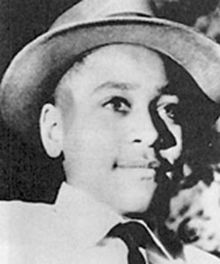 Emmett Till
Emmett Till
For years, the auburn-haired white man has educated students about activists in their own state who led peaceful demonstrations, and the wrath of segregationists who channeled violence to repress social change.
Soon, civil rights lessons be will required for students from kindergarten to 12th grade all across Mississippi.
A civil rights/human rights curriculum becomes mandatory in all public schools for the 2011-2012 school year, five years after Gov. Haley Barbour signed the requirement into law.
Civil rights is typically a part of social studies programs in the nation's public schools. State officials believe Mississippi is the first state to require civil rights studies throughout all grades in its public school systems. Mississippi education officials say the change took some time to implement because they waited to include it in the revision of the social studies framework that was scheduled for 2011.
Barbour said he sees the value in the new curriculum.
``To not know history is to repeat it. And to learn the good things about Mississippi and America and the bad things about Mississippi and America is important for every Mississippian,'' Barbour said when asked about the curriculum during an interview with The Associated Press in December.
Barbour's comments earlier this month came just days before he stumbled into a controversy stemming from his own recollection of civil rights history. In a profile in the Weekly Standard magazine, Barbour made favorable comments about the White Citizens Council in his hometown, calling it an anti-Ku Klux Klan group.
Several liberal bloggers said Barbour left an inaccurate impression of Mississippi's local Citizens Councils, which sought to thwart integration in many areas.
Barbour has since backtracked, saying he was not trying to downplay the pain that many endured during the South's segregation era.
Paola, who teaches at predominantly-black Hattiesburg High School, is among those who believe civil rights lessons may have been given short-shrift for decades in a state where 50 percent of public school students are black and 46 percent are white.
``Certain issues are still taboo,'' said Paola, 38. ``It depends on your demographics. You teach to them, I suppose.''
To ensure civil rights are taught in the schools, the state has made the subject part of an assessment test students must pass for graduation.
Perry Overstreet, 17, said studying civil rights in Paola's class had an impact on him.
Overstreet said he recently visited Glendora, the Delta town where black 14-year-old Emmett Till was taken by two white men in 1955 and his body dumped in the Tallahatchie River.
Because he had learned about Till, Overstreet said he was able to seek out landmarks associated with the case that sparked outrage and fueled the movement.
``It really opened my eyes to civil rights,'' said Overstreet. ``Mississippi has come a long way from back then.''
Paola helped write the new curriculum, which had support from the Winter Institute for Racial Reconciliation at the University of Mississippi. Paola believes the change is needed because ``every year the movement itself loses momentum.''
``What I find in this level of class, they know who the people are, but they don't understand the story. They're old enough to see racism on the street. They get angry. I love when they get angry. It really pushes the nonviolent discussion,'' Paola said.
Derrick Johnson, president of the Mississippi NAACP, said the curriculum will help students better understand current political issues.
``In many cases, what we see today concerning the treatment of undocumented workers is very reminiscent of the treatment of African Americans during and before the Civil Rights Movement,'' Johnson said.
Not everyone is pleased with the new civil rights emphasis.
Rep. John Moore, R-Brandon, has filed a bill to repeal the law nearly every year since 2006. Moore, who lives in a suburb of Jackson, said he wants to know who will write the textbooks and craft the materials students will be taught.
``I want schools to be teaching my grandchildren to read, write a complete sentence and do math,'' Moore said. ``I just want to make sure it's teaching the truth and facts and not being accusatory of one group of people or the other. I don't want it to be somebody's philosophical idea of what civil rights are.''
The state Department of Education hasn't found another state with framework that incorporates civil rights studies in grades K-12, said Chauncey Spears, who works in the Mississippi agency's curriculum and instruction office.
Spears said school districts can tailor their textbook orders to support what will be taught, and some resources could be donated. The course work might also include visits to historic sites, and veteran activists will be asked to speak with classes.
``In kindergarten, you won't talk about community organizing, but you'll talk about issues of relationship or respect and then it progresses from that,'' Spears said.
In DeSoto County, an affluent school district not far from Memphis, Tenn., school officials say they're eager to begin.
``With our proximity to Memphis and access to resources such as the Civil Rights Museum, our students can not only learn about an important era in our nation's history, but they can also learn a great deal about the history of this region,'' said Jennifer Weeks, the district's associate superintendent of curriculum.
- Home
- News
- Opinion
- Entertainment
- Classified
- About Us
 MLK Breakfast
MLK Breakfast- Community
- Foundation
- Obituaries
- Donate
04-19-2024 7:33 pm • PDX and SEA Weather






















































































































































































































































































































